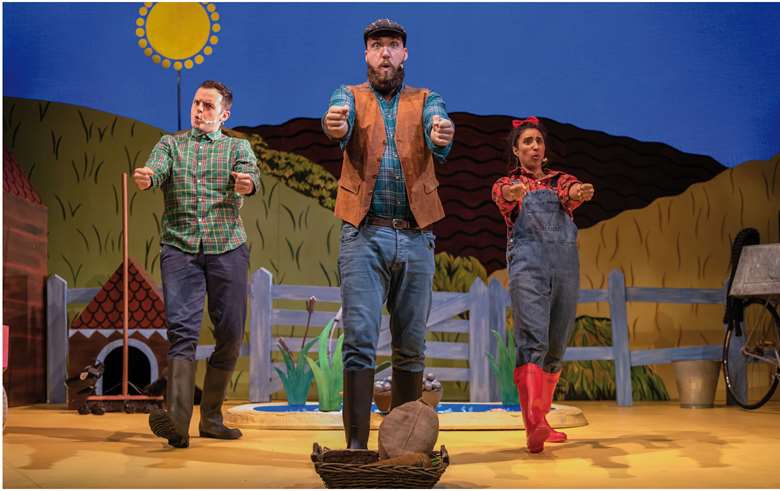The theatre bug: What The Ladybird Heard
Hattie Fisk
Wednesday, September 1, 2021
A new cast and UK tour has been announced for What The Ladybird Heard – the stage adaptation from Julia Donaldson's bestselling children's book. Hattie Fisk speaks to Graham Hubbard about adapting and directing the show, and the importance of sharing its joy with young audiences

David Monteith-Hodge/ Photographise
After delivering magical and engaging performances to children up and down the country, the much-loved stage adaptation of What the Ladybird Heard will welcome a plethora of families into the Palace Theatre in the West End this Autumn.
Graham Hubbard, who has adapted and directed this production, admits his favourite element of the show is still watching the audience walk in, and the glowing smiles on children who believe they are suddenly in the pages of their favourite book.
Creating a wonderland
The mission is personal for Hubbard, as he explains that delving into theatre after seeing a production of Alice in Wonderland when he was four sparked his curiosity about the arts. The joy of drama took him away from the struggles of apartheid where he grew up in South Africa and ignited a passion for creativity after witnessing the escapism of ‘a world of magic’. He elaborates: ‘Sharing one spontaneous moment in theatre can change lives. It is a unique escape, and the arts are essential for our mental health’. Particularly after something scary and in some cases traumatic, such as the COVID pandemic, Hubbard believes escapism is key.
For Hubbard, and lots of members of the arts community, each production is an opportunity to share with others the joy that theatre can bring, and this production for early years is no exception. ‘Every time I walk into the theatre it is Wonderland – and that's magic for me’ Hubbard says. ‘I hope I can share that with audiences of the future.’
As an educator, Hubbard believes the earlier children get into the theatre the better. ‘I think in really formative years, maybe ages four to seven but possibly earlier too, if you haven't had that magic experience then you are less likely to engage with theatre in later life. Getting our children into theatre is vital, because that is where you can form and share ideas'. When discussing the production, author Julia Donaldson agrees, saying: ‘After such a hard year it's important that we can provide creative escapism for young children, and this stage show will do just that’.
Maintaining engagement
Described by one audience member as a ‘mini musical’, the show has been designed to keep young audience members engaged for a stretch of time. But just how do you keep notoriously fidgety youngsters' attention?
For a start, the performance is packed with plenty of catchy songs from Jon Fiber and Andy Saw, with some lyrics from Howard Jacques, making it engaging from the word go. Hubbard warns me that there are a number of earworms throughout the production that can stay with audience members for weeks, but he also claims teachers can use this to their advantage. ‘We encourage teachers to use these songs and creative elements that are explored throughout the show, because that will engage the children and help them get to know their versions of the story. Ensuring creativity happens in the classroom, and not just the theatre, could lead to the next Chekhov or Tom Stoppard’.
Other engaging elements of the production include audience interaction: call and response, identifying the noises of the animals, singing along – ‘those basic elements in a way that isn't too predictable, or old hat’ says Hubbard. ‘I've tried to make the characters larger than life caricatures, as well as the naturalistic farmhands who tell the story.’
Choosing the right language
When tailoring a production, creating a workshop, or planning a lesson for early years, it is easy to speak in an overly animated way. This of course can be useful, but Hubbard learnt from experience that talking down to children is a huge mistake. ‘It is so easy to talk to them in a condescending way, which of course doesn't cut it for a child – they just disengage right away’.
Although responses vary from audience to audience, Hubbard claims it is clear to the actors when they have lost the attention of their young audience. Some elements of the production have been shortened to retain the engagement of children, such as the scene where the robbers try to steal the prize cow, as this scene has less colour and occasionally some children can get scared.
‘The answer to engaging young children in theatre is to keep driving through,’ says Hubbard. ‘It is quite exhausting as an actor to have lots of vocal responses from children – and some of them can be deafening! So, the way to do it is just to be very present and spontaneous and know how to play with each audience, because it is never the same twice.’
The UK tour will run from 16 September 2021 until 2 January 2022. For more information or to buy a ticket for What the Ladybird Heard, visit whattheladybirdheardlive.co.uk

